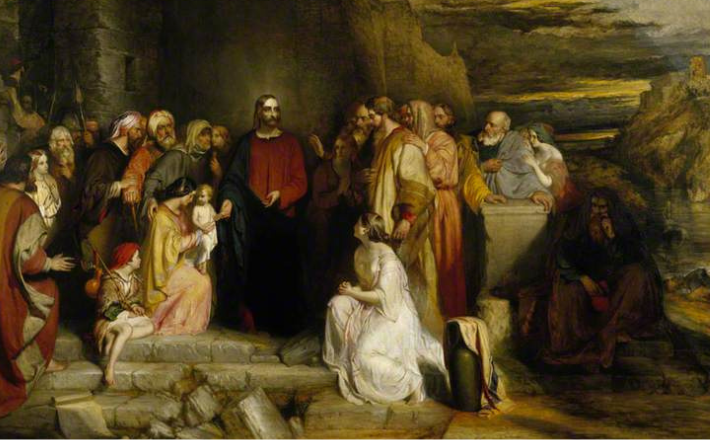Commentary on 1 Thessalonians 2:9-13
There’s an important detail about 1 Thessalonians that every reader should keep in mind and it’s so important that I will repeat it at the beginning of each of my commentaries: 1st Thessalonians is the oldest book in the New Testament. It is the first of the letters of Paul, written before any of his other letters and even before the Gospels. This letter gives us a glimpse into the concerns of one of the first communities outside of Syria-Palestine to receive the good news of Jesus Christ. It is an under-appreciated treasure.
Knowing that 1 Thessalonians comes first helps to give us a leg up on reading Paul. This letter highlights the occasional nature of Paul’s teaching and the way in which he addresses the needs of individual communities. This means that Paul requires more work to read because, as much as possible, we need to place ourselves in the sandals of his first readers in order to understand the concerns of the letter.
The pericope begins with a verse that reveals another detail that many readers overlook when dealing with 1 Thessalonians and the letters of Paul in general. The letter, for the most part, is written in the 1st person plural. It uses the words “us” and “we” because Paul does not work alone. Though we call the letter “Paul’s first letter to the Thessalonians,” the opening verse (1:1) makes clear that Paul, Silvanus, and Timothy are equal senders of the letter.
The trio begin by contrasting their ministry with that of religious freeloaders (2:9). Put simply, they worked for their daily bread, while those who come after them expect to be supported by the community. This conflict over whether evangelists should receive benefits from their communities provides an example of attention to community concerns. Here, the writers object to people taking advantage of the Thessalonians’ generosity. In another letter, when some members of the community struggle with selfishness, Paul demands the opposite. In 1 Corinthians 9:9, he cites the Old Testament (Deuteronomy 25:4) to prove that communities should provide support for evangelists.
To show their seriousness on this topic, the letter writers continue by swearing an oath. In our contemporary western world, oaths carry little weight. They linger only in parts of legal procedure: the swearing of witnesses for a jury or applying for a passport. Both those cases, however, deal entirely with civil affairs. The writers of 1 Thessalonians, in contrast, call the Thessalonians and God as witnesses to the truth of their claims. They shift the playing field from human conduct to divine judgment, calling upon God to punish them if they are lying. Because their ancient audience took oaths so seriously, this sentence would grab their attention and underline the importance of the point being made.
The letters of Paul overflow with metaphors and the authors shift from their oath to a metaphor based on the ancient Mediterranean family. Because the reading begins at verse 9, a reader might miss the way in which the trio use both maternal and paternal metaphors for themselves. They begin by using the imagery of nursing infants to emphasize the bond that they feel with the Thessalonian community (2:7). Then they shift metaphors to highlight the growth that they see. In a Roman household, a nurse took responsibility for the care and feeding of infants. As the child grew, the father became responsible for their education. By describing themselves as fathers of the Thessalonians (2:11), the trio emphasize that they have done more than just start the community. They have also contributed to the growth and education of their community.
This emphasis on the paternal role in education mirrors some of the conflicts seen in other Pauline letters. In Galatians, especially, Paul complains that later evangelists have placed themselves in the roll of “improving upon” or “adding to” Paul’s gospel (Galatians 1:6-9).Those competing evangelists try to restrict Paul and his companions to the role of nurse, acknowledging that the trio founded communities, but placing themselves in the fatherly role of educators. By following their oath with their claim to paternity, Paul, Silvanus, and Timothy warn the Thessalonians against anyone who would claim that they need further instruction.
The abrupt shift from maternal to paternal metaphors reflects the fact that the Thessalonians have “grown up so quickly.” They accepted the trio’s preaching immediately (2:13), and then showed their understanding by enduring persecution (2:14). This reception of the word of God echoes another theme from the rest of Paul’s letters: True preaching of the Gospel comes from God, not from human beings (see also Galatians 1:11-12). It also may be a reference to Jesus’ preaching in the Parable of the Sower (Mark 4:3-9; 14-20). In that parable, Jesus criticizes people who receive his word with joy, but then fall away under persecution (4:17). Jesus compares these over-eager recipients of his words to plants that cannot endure the sun because they have no roots. The Thessalonians, in contrast, by enduring suffering for the sake of the Gospel, show that they are not fair weather fans. They are like the good grain that hears the word and goes on to bear fruit (4:20).
By contrasting human words with the word of God, the authors of 1 Thessalonians emphasize that the true Gospel is a power that works in and of itself. Humans may preach words, but unless the word comes from God, it will not accomplish anything. This may be a perplexing point to modern readers: how do words do things? When discussing this point in my classes, I have found the Lord of the Rings by J.R.R. Tolkien provides an apt illustration. I would point those who are fans of the Lord of the Rings to the beginning of the first movie, The Fellowship of the Ring, in which the wizard Gandalf warns Frodo that the Ring, a seemingly inanimate object, is trying to get back to its master Sauron. This scene may provide a useful illustration of this point for a sermon or Bible Study.



November 5, 2023